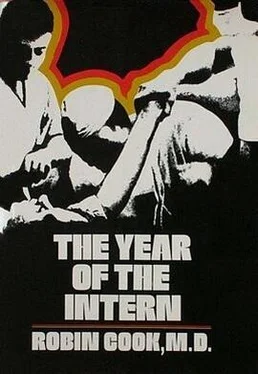“Yeah.”
“What’d he say?”
“He said to call you.”
“Oh, fine.” I hesitated, collecting my thoughts. “Is it a private patient?”
“Yes, Dr. Narru, or something like that.”
“Is it a teaching case?”
“I don’t know.”
“Well, check, Straus.” I played with the bell of my stethoscope while Straus left the line. Jan was making good headway with the books; it began to appear that she would get them all in.
“Yeah, if s a teaching case, Peters,” said Straus.
“Did you call Dr. Narru?”
“Sure. I did that first.”
“What’d he say?”
“He said to go ahead and do whatever was necessary, that he’d stop by later and check on things when he made his evening rounds.”
With my index finger, I tipped my watch over so I could see the dial. Five after eleven. Either Narru was putting Straus on or he really did make late-evening rounds — very late. Somehow I couldn’t imagine that.
“Jan, why don’t you put Christopher’s surgical text in before those little books? Just a minute, Straus. Christopher’s is that big red one. That’s it.” It was going to be close. “All right, Straus, what kind of surgery did this fellow have?”
“I’m not sure. Some sort of abdominal surgery. He has an abdominal dressing.”
“Does he have a fever?”
“A fever? I don’t know.”
“Is he on digitalis?”
“I don’t know. Look, all I’ve done is listen to his chest.”
“Did you listen to his heart?”
“Sort of.”
“Was there a gallop rhythm?”
“I’m not sure,” he said evasively.
Good God, this guy is really eager, I thought sarcastically. “Straus,” I said, “I want you to examine the patient, keeping in mind three possible diagnoses — pulmonary edema, which he probably has, pulmonary embolism, and pneumonia. Read the chart and find out about his cardiac history. Meanwhile, get a chest film, a complete blood count, a urinalysis, an EKG, and anything else you think you want. Is he very stuporous?”
“No, he’s quite alert.”
“Okay, then give him 10 mg. of morphine and put him on oxygen with a mask. But be sure to watch him carefully when you first give the oxygen. Then, when you get everything organized, call me back.”
I was about to hang up when I thought of something else. “One other thing. If he’s never had digitalis — at least, not during the last two weeks — give him 1 mg. of digitoxin IV. But do it slowly. Straus, are you still there?”
“I’m here,” he said.
“We probably should give him some diuretic as well, to get rid of some of his excess fluid. Try about 25 mg. of ethacrynic acid.” I knew that stuff was so powerful it would wring pee from a stone. Powerful — my inner fear of diuretics made me think twice, and I changed my mind.
“On second thought, hold the diuretic until we’re sure of the diagnosis of pulmonary edema. If he has pneumonia, it wouldn’t help too much.” The old lady with cancer whom I had killed with the diuretic haunted me for a moment; she had died of pneumonia. Finally I hung up the phone.
“Hey, Jan, that’s great.” She’d been able to squeeze in all but one small book. The remaining volume was what we called a throwaway — one given out by a drug firm hoping to convince somebody that one of its drugs was the answer to all pathological evil. I’d never read it, nor did I intend to. Nevertheless, I jammed it into one of my already full suitcases.
Except for my shaving equipment and other toilet articles, the clothes I was going to wear in the morning, and the dirty set of whites I was now wearing, all my junk was packed. The shippers were scheduled to take my trunks in the morning; the suitcases were going with me, along with an array of hand luggage that included a large piece of coral. Finally all was ready. I could relax and enjoy what remained of my year in Hawaii.
Jan chose that moment to drop her bomb by abruptly informing me she was going home. Just when we could forget all the packing and be together, she decided she was leaving. Obviously, it came as a complete surprise, since I had blithely assumed we would sleep together, as usual.
“Jan, why in heaven’s name do you have to leave? Please stay. If s my last night.”
“You need a good night’s sleep before your trip,” she said evasively.
“Well, how about that!” I gazed into her tanned face. She looked at me with her head tilted slightly forward and to one side, flirting expertly and suggesting that her sudden coyness was based on complicated female reasons. Yet I wasn’t sure. I could understand her desire to leave if it sprang from a disdain for the artificial last-night routine, from not wanting to reduce our love-making to a sort of ritual to celebrate a passing era. The closeness we normally enjoyed probably wouldn’t have been there, anyhow, since we were both preoccupied with other thoughts.
She kissed me lightly, said she’d see me in the morning, and noiselessly floated out the door. It all happened too rapidly for mental digestion.
Fleetingly, I thought of going to the ICU, even though I didn’t really want to, but ultimately I shrugged off the thought with the rationalization that Straus needed to stand on his own two feet.
So I decided to take a shower — and no sooner had I stepped in than the jangle of the telephone sounded. The only way I could drown out the ring was by putting my head directly under the nozzle. I shouldn’t have left the bathroom door ajar. But habit won out. On the fourth ring I sprinted back to my room and picked up the phone, while a puddle at my feet rapidly expanded its periphery.
“Peters, this is Straus.”
“What a surprise!”
“Guess what? Good news!”
“I’m certainly ready for a little of that.”
“The pulmonary-edema patient I talked to you about turns out to be on the medical service, not surgical, and the medical intern has assumed control.
“What about his surgery?” I asked, quite surprised.
“He hasn’t had any surgery. At least, nothing recent. The dressing was covering a colostomy he’d had put in years ago.”
“Congratulations, Straus. Your first clinical success as an intern. But why don’t you hang in there just the same? Unless, of course, you have something else cooking.”
“Sorry, can’t stay. I got a call from surgery. They’ve scheduled a kneecap removal. Automobile accident, I think. Unless you want to go, I’ll head up there.”
A patellectomy, an orthopedic case! It was becoming very clear to me how much I would treasure being a resident rather than an intern. Imagine being able to send someone else on a midnight patellectomy! That was true happiness.
“I wouldn’t deprive you of the pleasure, Straus. You go ahead and scrub.”
Orthopedic surgery really freaked me. Before med school, I had labored under the delusion that surgery was an accurate and delicate science. Then had come the holocaust of my first orthopedic scrub, where I witnessed the grossest nail pounding, drilling, and bone crunching I could possibly have imagined. Not only that — the mayhem had also been accompanied by comments like “Get X-ray in here so I can see where the hell that nail went”; then, after looking at the X ray, “Damn, missed the hip fragment completely. Let’s pound in another one, but this time aim at the belly button instead.”
Such experiences had quickly eliminated orthopedic surgery as a specialty for me. Neurosurgery had fallen away soon after, when I saw the best neurosurgeon in New York pause during a case and peer into the hole he’d dug in a patient’s brain to ask, “What is that light gray thing?” No one answered — after all, he was only talking to himself — but that was the end of neurosurgery for me. If he didn’t know where he was after twenty years, there was no hope that I’d ever learn.
Читать дальше












